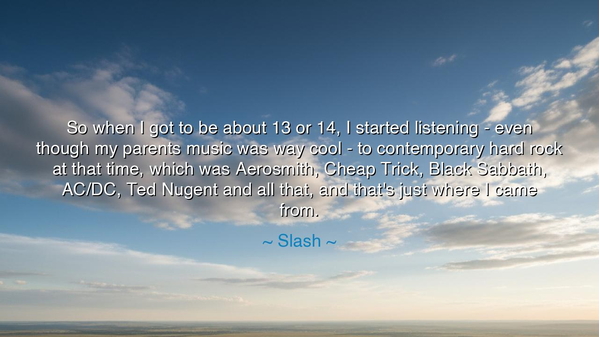
So when I got to be about 13 or 14, I started listening - even
So when I got to be about 13 or 14, I started listening - even though my parents music was way cool - to contemporary hard rock at that time, which was Aerosmith, Cheap Trick, Black Sabbath, AC/DC, Ted Nugent and all that, and that's just where I came from.






In the journey of self-discovery, there comes a pivotal moment when the voice of tradition is heard but the call of the new becomes louder. Slash’s words, "So when I got to be about 13 or 14, I started listening—even though my parents' music was way cool—to contemporary hard rock at that time, which was Aerosmith, Cheap Trick, Black Sabbath, AC/DC, Ted Nugent and all that, and that's just where I came from," speak to this moment of transformation, where the child must step away from the world of their parents and embrace the sound and spirit of their own generation. Music, like life itself, is an evolving force—one that connects individuals to their past, but also propels them into their future.
In the ancient world, each generation had its own music—the songs of the bards in the courts of kings, the chants of warriors marching into battle, and the lyres of philosophers pondering the mysteries of life. Yet, even in these early times, there was a split between the old and the new. The great Homer, who recorded the heroic deeds of Achilles and Odysseus, lived in a world where the music of the past was cherished, but new voices were rising. The youth of the time, as they grew, found themselves at a crossroads, torn between honoring the ancient traditions and pursuing their own creative paths. Just as Slash was drawn to the electric guitars and rebellious sound of rock bands, so too did the young in ancient Greece seek their own voices, creating new art and culture that would define their era.
In this moment of choosing one's own path, there is often a rebellion—a need to break away from what came before. This is the essence of Slash’s journey. He speaks of his parents' music as "way cool," but acknowledges that, as he grew older, his ears were drawn to the pulse of the present. The music of Aerosmith, Black Sabbath, and AC/DC symbolized the energy of his generation—the raw, untamed spirit of rock and roll, a force that stood apart from the old guard. It was the sound of freedom, of breaking down the walls of tradition, and finding a voice that was uniquely his. In this, Slash’s story mirrors the tale of countless generations that have sought to carve out their own identity in the face of cultural expectations.
The ancient Romans, for example, saw similar tension between the old and the new. The rise of imperialism and the spread of Roman culture across Europe brought with it a clash of traditions. While the Senate and the nobility clung to the values of the Republic, the common people, particularly the youth, embraced new forms of expression, whether in art, theater, or even the gladiatorial games. The Romans, like Slash, were not content to remain in the shadows of their ancestors; they sought their own identity, one forged in the fires of ambition and innovation.
Slash’s experience also touches upon the importance of influence and identity. Just as his parents’ music shaped his early understanding of sound and culture, so too did the rock and roll bands that captured his imagination influence the way he would create and express himself. It was not just the music that resonated, but the lifestyle and the values those bands represented—freedom, individualism, and the willingness to embrace the unconventional. In this way, Slash’s journey is not only about music, but about the process of becoming, of defining oneself in the face of societal expectations and tradition.
The lesson here is powerful: the new is not to be feared, nor should it be rejected in favor of the old. To grow, to evolve, and to find one's voice, it is often necessary to break free from the shadows of the past. But this growth does not erase the past; rather, it builds upon it. Just as Slash found his own identity in the music of his time, so too must we find our individuality in the ever-changing flow of culture. The challenge is not to abandon the influences of the past, but to recognize that they are the foundation upon which we build something new, something uniquely our own.
In practical terms, this means embracing change and innovation in our own lives. Just as Slash was drawn to the music of his time, we too must allow ourselves to be influenced by the world around us, but also to use that influence to forge our own path. Whether in art, business, or personal development, we must recognize that growth comes not from blindly following tradition, but from building upon it, from embracing the future while respecting the lessons of the past. In doing so, we honor both our heritage and our potential to create something new and extraordinary.






AAdministratorAdministrator
Welcome, honored guests. Please leave a comment, we will respond soon